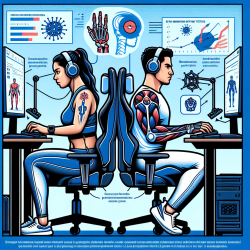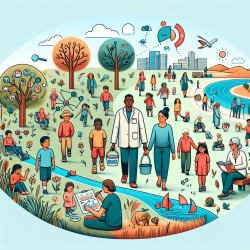Introduction
In the realm of speech-language pathology, understanding the nuances of Autism Spectrum Disorder (ASD) is crucial for effective intervention. A recent study titled "Development of a phenotype ontology for autism spectrum disorder by natural language processing on electronic health records" offers groundbreaking insights that can enhance diagnostic accuracy and therapeutic outcomes. By leveraging Natural Language Processing (NLP) on Electronic Health Records (EHR), this research has identified a comprehensive set of ASD phenotypic terms, paving the way for more precise and personalized care.
The Power of Natural Language Processing
NLP is a branch of artificial intelligence that enables computers to understand and interpret human language. In this study, NLP techniques were employed to analyze unstructured clinical notes from EHRs of 8,499 individuals with ASD. The result was the identification of 3,336 ASD-related terms linked to 1,943 unique medical concepts. This vast terminology set represents one of the largest collections of ASD-related terms to date, organized into a formal ontology structure akin to the Human Phenotype Ontology (HPO).
Implications for Practitioners
For practitioners, this research provides a robust framework for improving diagnostic precision and therapeutic interventions. Here’s how you can implement these findings:
- Standardized Vocabulary: Utilize the comprehensive ASD terminology set to create a common language for describing phenotypic traits. This can enhance communication among clinicians and improve the consistency of diagnoses.
- Automated Diagnosis: Integrate the ASD phenotype ontology into diagnostic tools to facilitate automated identification and subtyping of ASD. This can streamline the diagnostic process and reduce the subjectivity inherent in clinical assessments.
- Personalized Therapy: Use the detailed phenotypic data to tailor interventions to the unique needs of each child, thereby enhancing therapeutic outcomes.
Encouraging Further Research
While this study marks a significant advancement, it also opens avenues for further research. Practitioners are encouraged to explore the following areas:
- Cross-Institutional Studies: Leverage the open-access ASD terminology set to conduct studies across different clinical settings, enhancing the generalizability of findings.
- Integration with Other Data: Combine phenotypic data with genetic, behavioral, and environmental information to develop a holistic understanding of ASD.
- Longitudinal Studies: Investigate how phenotypic traits evolve over time and their impact on long-term outcomes.
Conclusion
The development of a phenotype ontology for ASD using NLP on EHRs is a pivotal step toward more accurate diagnoses and personalized interventions. By adopting these findings, practitioners can significantly enhance the quality of care for children with ASD. To delve deeper into this research, please follow this link: Development of a phenotype ontology for autism spectrum disorder by natural language processing on electronic health records.










